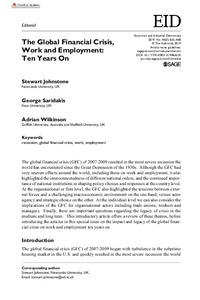The global financial crisis, work and employment: ten years on

Johnstone, Steward ; Saridakis, George ; Wilkinson, Adrian
Economic and Industrial Democracy
2019
40
3
August
455-468
economic recession ; work ; employment
Labour economics
https://doi.org/10.1177/0143831X19866532
English
Bibliogr.
"The global financial crisis (GFC) of 2007-2009 resulted in the most severe recession the world has encountered since the Great Depression of the 1930s. Although the GFC had very uneven effects around the world, including those on work and employment, it also highlighted the interconnectedness of different national orders, and the continued importance of national institutions in shaping policy choices and responses at the country level. At the organisational or firm level, the GFC also highlighted the tensions between external forces and a challenging macroeconomic environment on the one hand, versus actor agency and strategic choice on the other. At the individual level we can also consider the implications of the GFC for organisational actors including trade unions, workers and managers. Finally, there are important questions regarding the legacy of crisis in the medium and long term. This introductory article offers a review of these themes, before introducing the articles in this special issue on the impact and legacy of the global financial crisis on work and employment ten years on. "
Digital
The ETUI is co-funded by the European Union. Views and opinions expressed are however those of the author(s) only and do not necessarily reflect those of the European Union or the ETUI.